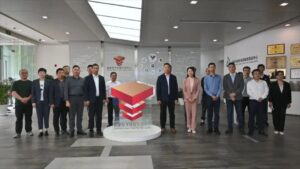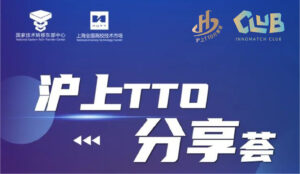Source:Shangguan News
Author: Yu Tao Ran
summary
The event aims to build a platform for cooperation and exchange, inviting consulates, consulates and organizations in Shanghai to meet with Zhangjiang's parks and enterprises, and promoting their integration into the international innovation system.
Organized by the Shanghai Zhangjiang Hi-Tech Zone Management Committee and undertaken by the Shanghai Science and Technology Development and Exchange Center, the "Consul-in-Zhangjiang" event was held yesterday and featured 22 consuls general, consuls, consuls general and consuls in Shanghai, including France, Belgium, Denmark, the Netherlands, Russia, the United States, South Africa, Australia, Iran, Japan, Malaysia and Sri Lanka. Representatives of institutions, as well as representatives of 17 parks and enterprises in Zhangjiang National Independent Innovation Demonstration Zone gathered together for in-depth exchanges. According to the introduction, the event aims to build a platform for cooperation and exchange, invite consulates and embassies of various countries in Shanghai to meet face-to-face with the parks and enterprises in Zhangjiang, promote the integration of Zhangjiang's parks and enterprises into the international innovation system, increase international cooperation and broaden international channels.
Australian government selects startups to "test the waters" in Shanghai
Susan Corbisiero, Deputy Consul-General of the Australian Consulate-General in Shanghai, said in her speech that Australia has strong strength in science and technology innovation in areas such as cyber security, health care, water treatment, etc.; in the field of basic science, 15 Nobel Prize winners have been born; in higher education, six universities are ranked among the top 100 universities in the world, the overall strength is only second to the United States, the United States and other countries. UK and Germany. Therefore, Australian companies and universities have a wide scope for cooperation with Shanghai and welcome innovative companies from Shanghai to develop in Australia.
At the end of 2015, the Australian Government launched the National Science and Innovation Plan, of which the Makers Landing Program is a part. The Australian Government has allocated $11.2 million to support startups in the country's science, technology and innovation sectors to explore overseas markets, and has established five bases in San Francisco, Berlin, Tel Aviv, Shanghai and Singapore. Startups selected for the "Hacker's Landing" program will have access to the five bases and receive 90 days of localised services. In September last year, the Australian government decided to set up the Shanghai base in XNode, a crowdfunding space located in the Overseas Chinese Building in Jing'an District, which has gathered entrepreneurs from 19 countries and regions, with a ratio of Chinese to foreign entrepreneurs of about 1:1.
The first batch of Australian startups will be incubated in Shanghai from February 13, Susan explained. Among them, some of them have developed 3D and holographic projection, which can bring immersive gaming and exhibition experience to users; some of them have developed indoor location navigation and passenger flow behavior analysis solutions based on wireless signals and want to find Chinese customers. These Australian high-tech enterprises are also expected to find Chinese partners in Shanghai to upgrade their products or make them more localized.
Zhangjiang Boston Garden invites U.S. companies to move in
Xu Jianmao, deputy director of Zhangjiang High-tech Zone Administrative Committee, said that Shanghai is building a science and technology innovation center with global influence, and Zhangjiang, as the core carrier, has gathered high-end innovation resources at home and abroad, and established leading industrial clusters such as new-generation information technology, high-end equipment manufacturing, biomedicine, energy conservation and environmental protection, and new materials, which are well positioned to play an important role in the new round of international cooperation.
Shanghai Baotian Biomedical Technology Company, located in Zhangjiang Medicine Valley, is a company dedicated to medical big data, precision medicine and precision health management. Chairman Lou Jingwei told diplomats that for the past eight years, they have been working to collect enough patient genetic and clinical phenotypic data and process it to find correlations and make decisions for patient treatment and health management.
In the process of serving hospitals and undertaking major national projects, BaoTeng has accumulated databases of various diseases. For example, esophageal cancer, the current number of patients in the database has reached 507,000 cases, and more than 1,000 cases have been completed with full genome sequencing, making it the largest esophageal cancer database in the world. In addition, in the field of prostate cancer, pancreatic cancer and liver cancer, the company also has the largest amount of data in the world. With this "family background", Lou Jingwei hopes to collaborate with foreign medical institutions to provide Chinese version of precision medical services to patients.
Zou Shujun's speech. Photo by Shanghai Science and Technology Development and Exchange Center
BaoTeng is also working with Shanghai Zhangjiang Boston Enterprise Park to participate in the construction of an industrial innovation center in the park. According to Zou Shujun, executive vice president of the Zhangjiang Demonstration Zone's International Technology Transfer and Transformation Cluster, the Shanghai-Zhangjiang-Boston Corporate Park is scheduled to open in June of this year and is suitable for innovative companies from both China and the United States. For Chinese companies, it is easy to cooperate with Harvard University, Massachusetts Institute of Technology and other well-known research institutions in Boston to bring in high-level "foreign brains"; for American companies, they can cooperate with the Zhangjiang Hi-Tech Zone Management Committee and other government departments as well as Chinese enterprises to explore the Chinese market. "It's an icebreaker," Zou Shujun said, Shanghai Zhangjiang Boston Enterprise Park is the first example of cooperation between China and the United States to build a high-tech park, which will provide a high-end platform for scientific and technological cooperation between the two countries, and welcome American companies and research institutions to cooperate with it to achieve a win-win situation.
Source:Shanghai Science and Technology Exchange Center Photo Editor:Zhou Yinjie





